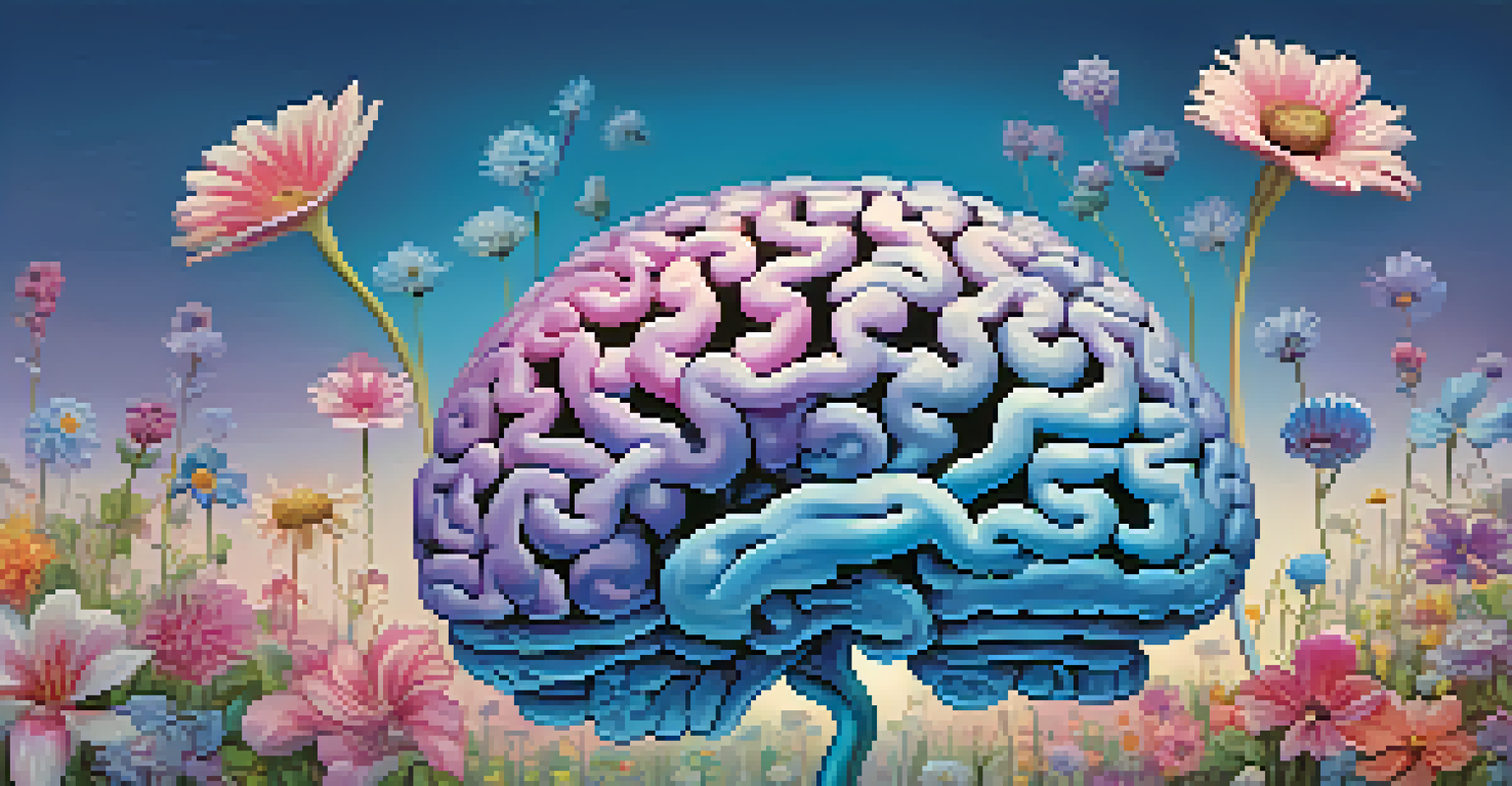Microdosing Psychedelics: Effects on Learning and Retention

Understanding Microdosing and Its Popularity
Microdosing refers to the practice of consuming very small amounts of psychedelics, typically about one-tenth of a recreational dose. This trend has gained traction in recent years, particularly among creatives, professionals, and students seeking cognitive enhancement. Many users report increased focus, creativity, and emotional balance, making microdosing a topic of interest for those looking to improve their learning experiences.
The mind is everything. What you think you become.
The appeal of microdosing lies in its potential to provide benefits without the intense experiences associated with full doses. Instead of experiencing vivid hallucinations or altered states of consciousness, microdosers often report subtle enhancements in mood and cognitive function. This gentler approach allows individuals to integrate these substances into their daily lives while avoiding significant disruption.
As scientific research begins to catch up with anecdotal evidence, the conversation around microdosing continues to evolve. While some experts remain skeptical, others advocate for the potential of these small doses to unlock new pathways in the brain, fostering an environment conducive to learning and retention.
The Science Behind Learning and Retention
Learning and retention are complex processes influenced by various factors, including attention, motivation, and memory. When we learn something new, our brains create neural connections that help us recall information later. However, these connections can weaken over time without reinforcement, which is where techniques like microdosing may play a role in enhancing retention.

Research has shown that psychedelics, including substances like psilocybin and LSD, can facilitate neuroplasticity, the brain's ability to reorganize itself by forming new neural connections. This means that microdosing might help strengthen the pathways associated with learning, making it easier to retain information. Imagine your brain as a garden; microdosing could act as fertilizer, helping your knowledge to grow strong and resilient.
Microdosing Enhances Learning
Microdosing may improve cognitive function, creativity, and emotional regulation, creating a more effective learning environment.
Additionally, improved mood and reduced anxiety, reported by many microdosers, can create a more conducive learning environment. When individuals feel more relaxed and focused, they are better equipped to absorb and retain information. This highlights the potential dual benefits of microdosing: enhancing cognitive function while simultaneously promoting a positive emotional state.
Potential Effects of Microdosing on Cognitive Function
Users of microdosing often report heightened creativity and improved problem-solving abilities. These cognitive benefits can be particularly useful in educational settings, where innovative thinking can lead to deeper understanding and retention of material. Picture a student tackling a complex project; microdosing might help them approach it from new angles, ultimately leading to better outcomes.
The greatest discovery of my generation is that a human being can alter his life by altering his attitude.
Moreover, microdosing may enhance focus and concentration, allowing individuals to engage more deeply with their studies or work. This increased attention can facilitate more effective learning sessions, leading to greater retention of information. It's akin to sharpening a pencil before writing; a sharper tool makes for clearer, more precise results.
However, it's crucial to recognize that individual experiences with microdosing can vary widely. While some may find significant cognitive improvements, others might experience little to no change. This variability highlights the importance of personal experimentation and understanding one's own responses to microdosing.
Microdosing and Emotional Regulation
Emotional regulation plays a vital role in learning and retention. When individuals experience stress or anxiety, their cognitive functions can be compromised, making it harder to focus and retain information. Microdosing has been linked to improved emotional well-being, providing users with a calmer state of mind that may facilitate more effective learning.
For instance, someone struggling with test anxiety might turn to microdosing as a means to manage their stress levels. By fostering a more relaxed state, they can approach their studies with a clearer mindset, ultimately enhancing their learning experience. This connection between emotional balance and cognitive function underscores the importance of mental health in educational settings.
Potential Risks of Microdosing
Despite its benefits, microdosing carries legal, safety, and psychological risks that users must navigate carefully.
Additionally, the positive emotional effects reported by microdosers, such as increased empathy and openness, can enhance collaborative learning experiences. When individuals feel more connected to their peers, it can lead to richer discussions and a deeper understanding of the material at hand.
Challenges and Risks of Microdosing
Despite the potential benefits, microdosing is not without its challenges and risks. The legality of psychedelics varies by region, and individuals must navigate the legal landscape carefully. Engaging in microdosing without a clear understanding of the substance and its effects can lead to unintended consequences, underscoring the need for thorough research.
Moreover, the lack of standardized dosing and quality control in the production of psychedelics raises concerns about safety and consistency. Users may find it difficult to determine the appropriate dose for their needs, which can result in ineffective or even harmful experiences. It's essential for anyone considering microdosing to approach it with caution and awareness.
Lastly, the psychological effects of microdosing can be unpredictable. While some may experience profound insights and clarity, others might face anxiety or discomfort. It's crucial to prioritize mental health and seek professional guidance if needed, ensuring that microdosing is approached responsibly and mindfully.
Real-Life Experiences: Anecdotes from Microdosers
Many individuals share their experiences with microdosing through online forums and social media, creating a community of like-minded explorers. One common theme in these anecdotes is the reported increase in creativity; artists and writers often describe moments of inspiration that feel amplified during microdosing periods. For them, it’s not just about learning; it’s about unlocking new realms of creativity.
Others recount how microdosing helped them overcome mental blocks or procrastination. A student might find that a small dose allows them to dive into a difficult subject with renewed enthusiasm, breaking through barriers that previously hindered their learning. These personal stories highlight the diverse ways microdosing can impact individuals' lives.
Anecdotes Highlight Personal Impact
Personal experiences shared by microdosers illustrate the diverse ways this practice can unlock creativity and overcome learning obstacles.
However, it’s important to approach these anecdotes with a critical eye. Personal experiences can vary widely, and what works for one person might not work for another. The journey of microdosing is deeply personal, and each individual may find different levels of success and challenges along the way.
The Future of Microdosing and Education
As the conversation around psychedelics continues to evolve, the potential for microdosing in educational contexts is gaining attention. Researchers are beginning to explore how these substances can be integrated into learning frameworks, potentially revolutionizing the way we approach education. Imagine classrooms where students are encouraged to explore their cognitive potential through mindful microdosing practices.
Future studies may provide insights into optimal dosing, timing, and combinations that maximize learning and retention while minimizing risks. This scientific exploration could pave the way for a new understanding of how psychedelics can enhance cognitive abilities in educational settings. It’s an exciting prospect that pushes the boundaries of traditional learning methodologies.

Ultimately, the future of microdosing in education will depend on continued research, open-mindedness, and responsible practices. With a growing body of evidence and a shift in societal perceptions, microdosing could become an integral part of the learning landscape, offering new opportunities for growth and discovery.